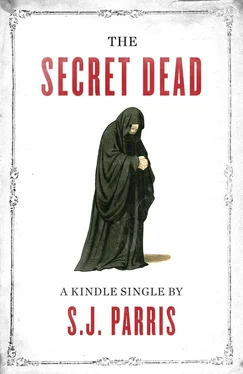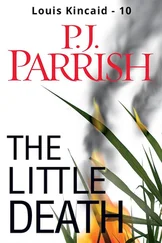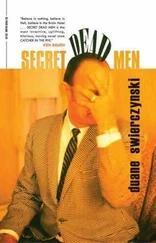S. Parris - The Secret Dead
Здесь есть возможность читать онлайн «S. Parris - The Secret Dead» — ознакомительный отрывок электронной книги совершенно бесплатно, а после прочтения отрывка купить полную версию. В некоторых случаях можно слушать аудио, скачать через торрент в формате fb2 и присутствует краткое содержание. Год выпуска: 2014, Жанр: Исторический детектив, на английском языке. Описание произведения, (предисловие) а так же отзывы посетителей доступны на портале библиотеки ЛибКат.
- Название:The Secret Dead
- Автор:
- Жанр:
- Год:2014
- ISBN:нет данных
- Рейтинг книги:4 / 5. Голосов: 1
-
Избранное:Добавить в избранное
- Отзывы:
-
Ваша оценка:
- 80
- 1
- 2
- 3
- 4
- 5
The Secret Dead: краткое содержание, описание и аннотация
Предлагаем к чтению аннотацию, описание, краткое содержание или предисловие (зависит от того, что написал сам автор книги «The Secret Dead»). Если вы не нашли необходимую информацию о книге — напишите в комментариях, мы постараемся отыскать её.
The Secret Dead — читать онлайн ознакомительный отрывок
Ниже представлен текст книги, разбитый по страницам. Система сохранения места последней прочитанной страницы, позволяет с удобством читать онлайн бесплатно книгу «The Secret Dead», без необходимости каждый раз заново искать на чём Вы остановились. Поставьте закладку, и сможете в любой момент перейти на страницу, на которой закончили чтение.
Интервал:
Закладка:
S. J. Parris
The Secret Dead
I was eighteen years old and had justtaken holy orders the summer Fra Gennaro found the girl. It was not the firsttime I had seen a naked woman. I had entered the Dominican order as a novice atfifteen, old enough by then to have tasted first love, the sweet warmth of agirl’s pliant body in the shade of the olive trees above the village of Nola. Adistant cousin, as it turned out; her family was livid. Perhaps that was why myfather had been so ready to pay out for my education, though God knows he couldill afford it. Sending me away to the Dominicans in the city was cheaper than ascandal. We were given new names on taking our final vows, to symbolize theshedding of our old selves. I took the name Giordano, though most people justcalled me Bruno.
Naples in the summer of 1566 was an inferno of heat andnoise, dust and crowds; a city of heart-stopping beauty and casual violence. Twohundred and fifty thousand souls seething inside ancient walls built to house one-tenththat number, the tenements growing higher and higher, until their shadowsalmost shut out the sun because land was scarce, so much of it taken up by thevast gardens and courtyards of the palazzos and the religious houses. Tensionsin the city streets brewed and boiled like the forces of the great volcano thatovershadowed them. Even walking from one side of a piazza to the other felt likefighting through the front line of an advancing army: elbows and fists,baskets, barrows, and hot, angry bodies jostling and shoving, trampling orcrushing one another. Horses and carts plowed through the heaving marketplaces whilethe sun hammered down without pity and blazed back from walls of yellow tufastone or from the flashing blades of knives drawn in exchanges of rich,inventive cursing. The Neapolitans discharged the tension by fighting orfucking, often at the same time. Soldiers of the Spanish viceroy patrolled thestreets, though whether their presence imposed order or fueled the general airof aggression depended on your view of our Spanish overlords. It was a city stinkingof hypocrisy: Kissing in public was illegal, but courtesans were permitted towalk the streets openly, looking for business even in the churches (especiallyin the churches). Blasphemy was also punishable by law, but beggars, vagrants,and those without work were allowed to starve in the streets, their bodiesrounded up each night on carts and thrown into a charnel-house outside thewalls before they could spread contagion. Thieves, assassins, and whoresthrived and prospered there and, naturally, so did the Church.
In the midst of this simmering human soup stood themagnificent basilica of San Domenico Maggiore, where the faithful could worshipthe wooden crucifix that had once spoken aloud to St. Thomas Aquinas. San Domenicowas one of the wealthiest religious houses in the city; the local barons allsent their superfluous younger sons there as a bribe to God, and many of mybrothers dressed and strutted like the young lords they still felt themselvesto be, keen to preserve the distinction of degree despite their vows. Thedeprivations of religious life were interpreted here with considerable lassitude;it must have been well known to the prior and his officials that a number ofthe novices had copied keys to a side gate and often slipped out into the heatof the city streets at night, but I never saw anyone punished for it, providedthey were back in time for Matins. Drinking, dicing, whoring — sins such asthese were straightforward, easy to overlook in young noblemen with highspirits. It was sins of thought that the authorities could not countenance. Inits favor, I should say that San Domenico prized other qualities than birth: Itwas famed as the intellectual heart of Naples, and a mere soldier’s son like memight be admitted at the Order’s expense if he showed enough promise as ascholar.
By early September, the city had grown heavy and slow,exhausted by the ferocity of the long summer’s heat; people barely made theeffort to curse as you pushed past them. There was a sense of apprehension,too; the previous autumn had brought a season of thick fogs off the sea carryingthe contagion of fever, and the epidemic had infected half the city. I hadtaken my final vows and been admitted to the Order in the spring, despite somemisgivings on the part of the novice master, who confided to the prior that FraGiordano Bruno had trouble submitting to authority and a taste for difficultquestions. During my novitiate, I had shown aptitude for my studies in thenatural sciences, and the prior had set me to work for a while as assistant toFra Gennaro, the brother infirmarian , in the belief that vigorous practicaltasks — measuring, chopping, and distilling remedies, helping to cultivate andharvest the plants used to make them, as well as tending to the ailments ofthose brothers confined to the infirmary — would occupy my mind and curb my willfulness.In this, he was mistaken; the more I learned about the natural world, itscorrespondences and hidden properties, the more my questions multiplied, for itseemed to me that our understanding of Creation, handed down from antiquitythrough the Scriptures and the Church Fathers, did not stand up to the mostelementary scrutiny and observation. Fra Gennaro regarded my questions withforbearance and a hint of dry humor; for the most part he proved an attentiveaudience, if noncommittal, while I formulated my doubts and theories aloud. Onlyrarely did he reprimand me when I overstepped the bounds of what he judged aGod-given hunger for knowledge. Few of the other friars would have shown suchtolerance.
Fra Gennaro had studied medicine and anatomy at the famousmedical school in Salerno. He had wished to become a doctor and eventually aprofessor, but some years earlier his family’s fortunes had shifted for theworse, obliging him to leave the university and offer his skills in God’sservice. It was not the worst blow Fate could have dealt him — he was grantedconsiderable freedom to further his medical knowledge in his new role, though Iunderstood there was some dispute with the prior over the morality of usingcertain Arabic texts — but it was not the life he had aspired to and, though henever voiced this, I sensed in him a restlessness, a wistful longing for hisold world. He was barely forty, but to me, at eighteen, he appeared to possessa wealth of knowledge and wisdom that I yearned toward — and not all of itsanctioned. In his heart, he was a man of science, and a Dominican onlyincidentally, as I felt myself to be; perhaps this accounted for theinstinctive affinity that quickly grew between us.
I was skulking through the darkened cloister one starlessnight in the first week of September, clouds sagging overhead like wet plasterand a warm, sickly wind sighing in off the bay, when I glimpsed him on the farside of the courtyard, his arms bundled full of linen. He was heading not to theinfirmary but toward the gardens, in the direction of the outbuildings andstorehouses at the furthest extremity of the compound, where the high enclosingwall backed on to a busy thoroughfare. Something in his bearing caught myattention — his unusual haste, perhaps, or the way he walked with his head down,leaning forward, as if into a gale. Though I risked punishment for being out ofmy cell at that hour, I called out to him, curious to know what he was about.If he heard me, he gave no sign of it, though I knew my voice must havecarried. Instead, he kept his eyes fixed on the ground ahead as he hurriedthrough an archway and disappeared.
I hesitated in the shadows, hoping I would not run into thewatch brothers. They made a tour of the cloisters shortly after Compline toconfirm that everyone was tucked up in his cell and observing silence duringthe few hours of sleep, then retired somewhere more comfortable until theirsecond circuit just before the bell chimed for Matins at two o’clock. If theyknew of the nightly exodus through the side gate in the garden wall, they werepracticed at looking the other way. But for a friar like me, with no familyinfluence to consider and a growing reputation for disobedience, it would be amistake to be caught. I could easily find myself a scapegoat for those they didnot dare to discipline too harshly.
Читать дальшеИнтервал:
Закладка:
Похожие книги на «The Secret Dead»
Представляем Вашему вниманию похожие книги на «The Secret Dead» списком для выбора. Мы отобрали схожую по названию и смыслу литературу в надежде предоставить читателям больше вариантов отыскать новые, интересные, ещё непрочитанные произведения.
Обсуждение, отзывы о книге «The Secret Dead» и просто собственные мнения читателей. Оставьте ваши комментарии, напишите, что Вы думаете о произведении, его смысле или главных героях. Укажите что конкретно понравилось, а что нет, и почему Вы так считаете.












